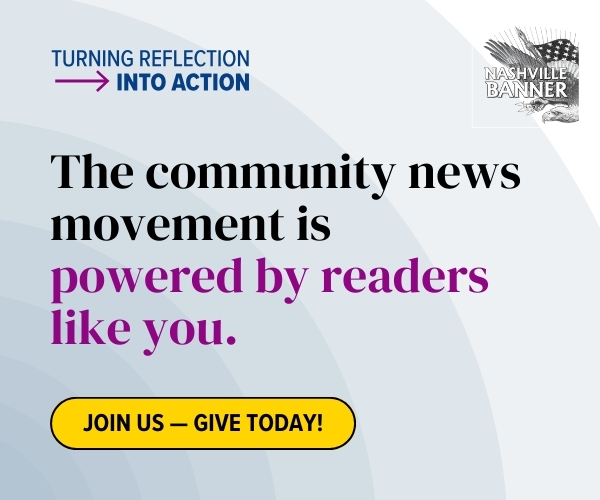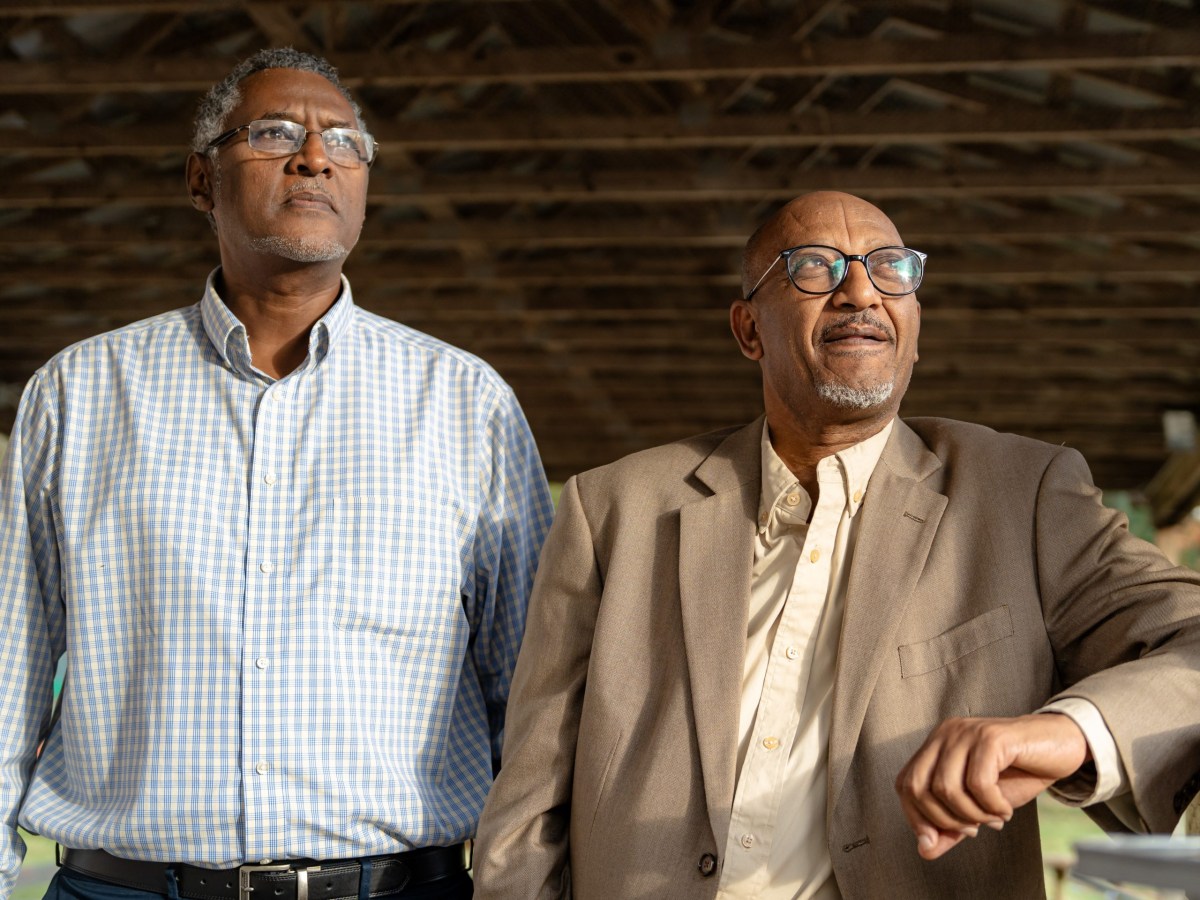Omer Ahmed and Adel Elrayah have been friends for three decades. Ahmed owns a non-emergency medical transportation business in Nashville and has been in the U.S. since he was a student at Tennessee State University in 1987. Elrayah is a retired professor of Business Information Systems at TSU who now has an IT business in Nashville.
Though they were both born in Sudan, they met in the U.S. while living in separate cities, and the first night Elrayah stayed in Nashville, he stayed with Ahmed.
They may not always agree when it comes to U.S. politics, they are of one mind about their native Sudan, which was plunged into war last year. More than 25,000 people have been killed since April 2023.
“What helped [the] Sudanese in this year and a half is really the people who are overseas [in the diaspora],” Ahmed said. “Without them there would have been a big problem.”
Much of that support came from Sudanese people living in the Gulf, North America and in Europe, Elrayah explained.
“Everyone needs money because no one is working, there’s no government money and you can’t access money in the bank, so you have to depend on someone local or outside,” Elrayah said, adding that it was not just family that people in the diaspora were helping but friends and neighbors as well.
“That phone will never stop,” he said.
“And how often you give depends on how much you have,” Ahmed added.
He and Elrayah estimate that there are about 2,000 members of the Sudanese community in the Nashville area. Every Sudanese Nashvillian who spoke to the Banner for this story said that they, and every Sudanese family they knew, had been helping people on the ground since the war began.
The largest displacement crisis in the world
Haythem, who asked that the Banner use only his first name out of fear of the Sudanese government, has lived in Nashville for 25 years. He said the war began with no warning. On April 15, 2023, someone in the central market in the capital city told his uncle, “get your family out of Khartoum.” Since then, in addition to the thousands killed, more than 11 million people have been displaced, making it the largest displacement crisis anywhere in the world. Each of the country’s 18 states are affected by the conflict.
The fact that the war began in the capital, Khartoum, makes it unlike any conflict in the nation’s history and has meant that families from across the country are affected.
“Everybody from Sudan has someone in Khartoum,” Elrayah said.
The war is between two formerly allied army officers: Abdel Fattah al-Burhan, who took power in a coup that overthrew a civilian government; and his former deputy, Mohamed Hamdan Dagalo, known as Hemedti. The two are now vying for control of the country. Al-Burhan commands the Sudan Armed Forces (SAF), and Hemedti heads the Rapid Security Forces (RSF), a paramilitary force formerly under the control of the military.
“What makes this war very complicated, whether you’re a casual observer or a close observer, is that there are no good guys,” said Dr. Khalid Mustafa Medani, Director of the Institute of Islamic Studies and chair of the African Studies program at McGill University. “That is something that’s confounding everyone I speak to, even the most seasoned analysts of wars.”
The U.S. government has sanctioned leaders of both sides in the conflict, has said that each is responsible for war crimes, crimes against humanity or both, and has chosen not to back one side over the other. Meanwhile, the civilian population is caught in the middle trying not to get killed.
Sixty-two members of Haythem’s family, including 27 children, took the road north to Egypt, joining more than 500,000 other Sudanese refugees who have fled there in the last year and a half, he told the Banner. Many of them paid smugglers to take them and some have perished on the journey.
Haythem’s father is now in Egypt. On the journey there, his wife, Haythem’s stepmother, went into a diabetic coma and fell down in the street, Haythem’s father told him. Two weeks later, she died and they buried her in Egypt.
Some of Haythem’s Sudanese family and friends in Egypt can’t afford phones so they keep in touch by email. Sometimes they write to him from internet cafes, or the Egyptian national library. Sometimes the staff at Cairo University library lets them check out books and send emails from the computers there, Haythem said.
Beyond the efforts of individual Egyptian civilians, there is little international support available for Sudanese refugees in Cairo, and the Egyptian government has engaged in mass arrests and unlawful deportations. So they, too, rely largely on grassroots initiatives from other Sudanese people.
The cost of staying in Egypt is so high that some are making the decision to leave.
“Now we have hundreds of Sudanese returning to Sudan despite the war because they’re unable to actually support their families given the expenses in Egypt so they’re taking the risk,” Dr. Medani said. “Especially the elderly have decided to return or to stay and not leave … They just are not able to withstand the tribulations associated with displacement and refugee status.”
In the past, Haythem’s family begged him to come to Cairo to see them. He wanted to see them but knew how far the money for the plane ticket would go if he just sent it instead.
He told them, “You need this money more than you need to see me.”
Now they are planning to leave because they heard rumors that the Egyptian government intends to implement a visa system that will require each person to pay $700. If that happens, they say they will go to Ethiopia or Libya.
Making sacrifices to send money from Nashville to Sudan
Every month, Haythem tries to send about $400 to one of his family members. At first, he would choose who to send it to that month by flipping a coin. Now he cycles through each family member and then starts again.
“If I help one this month, next month, I help somebody else,” he said.
Sending this kind of money has meant making economies in his own life. During his interview with the Banner, he said he’d had the clothes he was wearing for 10 years, that he never eats out and tries not to spend money unless it’s absolutely necessary.
“Even a toothbrush is an expense,” he said. “I’m trying to tell everyone in the community, if you’re in Europe or somewhere, you have to change your habits and save your money for people who need it — a family who needs to feed their kids. We’re in a war right now and we have to be a little bit fasting.”
Dr. Medani said this is true of the Sudanese diaspora across the globe.
“I don’t know one family that is not using all the resources they can, and I’m talking about the majority of their salaries, in order to send it to make people survive whether it is outside of Sudan who are refugees, or within Sudan,” he said.
Western Union used to be one of the standard ways by which people would send money to family in Sudan. But three months into the war, that company stopped operating there. These days, in order to send money to those still inside Sudan, people mostly use either the informal hawala system or Bankak, an application connected to the Bank of Khartoum.
“Without it, I don’t know what people would have done,” Ahmed said.
He and Elrayah explained that anyone with a Bank of Khartoum bank account — often a merchant or small shop owner — can use the app, and take commission when others send money through their account.
“Some of them, they do it for free, they don’t charge anything,” Elrayah said.
Humanitarian aid suspended
Since the war began, getting humanitarian aid to the civilian population has been a constant challenge with some parts of the country tipping into famine or at risk of it. One challenge international actors such as the United Nations face is obtaining permits and negotiating with the different armed groups.
Meanwhile, the Sudanese American Physicians’ Organization (SAPA) and local civil society groups have been providing lifesaving aid.
“Reliance on the diaspora was massive because [international organizations] suspended humanitarian programs,” said Dr. Anmar Homeida, director of SAPA.
He said because SAPA was working with mainly local medical teams, they did not face the same challenges international organizations did in obtaining permits. Their organization currently works both in areas controlled by the SAF as well as by the RSF.
The UN agencies do not have permission to operate in areas controlled by the RSF. Therefore they rely on partnerships with other organizations, most of them local, to conduct work there, according to Assadullah Nasrullah, communications officer with UNHCR in Sudan. He said that while UNHCR maintains a strong community network wherever they operate, that it was particularly important in the Sudanese context because of the challenges international organizations face in operating there.
Nasrullah said that the majority of the 11.5 million people displaced within Sudan are being housed within local communities. He said that while he has seen displaced people welcomed into communities in other places, “in Sudan I have observed it is more…it’s part of Sudanese culture as well, they have been hosting refugees for decades.”
Meanwhile, only 51 percent of the UN’s request for funding has been fulfilled by member nations, even as “the needs are growing every day,” Nasrullah said.
“It’s really … I don’t want to say ridiculous, but it’s a weird world,” Homeida said. “The people of Sudan are caring about themselves. … This is what we started to realize now … no one actually cares.”
But, he added, “the beautiful thing is, Sudanese communities are connected.”
How you can help
Here are a few groups working to aid those affected by the ongoing war in Sudan:
Sudan Solidarity Collective: The group formed in response to the outbreak of the war and seeks to support grassroots relief efforts in areas affected by the conflict.
Sudanese American Physicians Organization: This organization provides emergency medical aid kits, sets up mobile medical camps, provides food aid and shelter to Sudanese people displaced by the conflict. It is a nonprofit for physicians of Sudanese descent living and working in the U.S. and offers collaboration with and emergency assistance to doctors and healthcare organizations in Sudan and elsewhere.
Doctors Without Borders (MSF) Sudan: This group offers treatment for malnutrition, maternal care, vaccination campaigns and surgery and trauma care, and operates in areas controlled by both of the warring parties.



